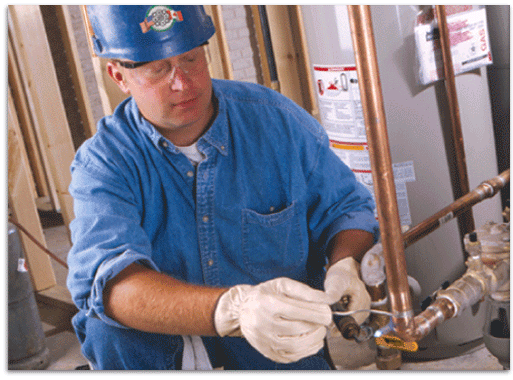A career in plumbing is a much sought-after career. Not so long ago, there was a distinct skills shortage in plumbing, leading to a sharp rise in potential earnings for professionals. The labour market has now stabilised and has fallen in line with other industry standards. Training to become a plumber is a worthwhile career choice that can lead to a lifelong career. But there are some pitfalls to bear in mind.
What are the minimum requirements?
A plumbing professional has to undertake years of training to become qualified. They also have to gain valuable site experience. It doesn’t matter if plumbing is your first career, or a change of career for mature learners, everyone has to meet certain minimum criteria.
The key point to bear in mind is that all plumbing professionals need to become registered professionals. Without registration, it is very hard to find work or get liability insurance. Gone are the days of the cowboy plumber.

To gain a place on a college course or apprenticeship scheme, a candidate must have as a minimum GCSE maths and science or equivalent. These have to be completed before training can begin. The skills of maths and science are incredibly important to a plumber.
Qualifications are a good starting point for new plumbers but site experience is also required. Qualifications equip the potential plumber with the basic skills and knowledge to begin a career but without that all important experience of sites the qualifications are not enough to enable a person to practise successfully.
What training & qualifications are available?
There are two routes that can be followed – the skills-based route or the qualifications route.
The skills-based route is based around the development of practical skills and knowledge and is assessed as a series of competencies. Some competencies may be assessed on site with others assessed with a training provider. In general, all apprenticeships for young people aged 16-25 years old will follow the skills-based route. Training is on-the-job working with a qualified plumber with the qualifications being achieved off-site at college on a day release or block release basis. The apprentice will be paid and sponsored for the duration of their training. The qualification achieved is National Vocational Qualifications (NVQ) or SVQ if in Scotland. To become a registered plumber a minimum of level 3 needs to be achieved.
The qualification route is open to anyone aged 16 years and upwards. Unlike the skills route, the candidate will achieve a qualification but may not gain site experience. Courses are available to anyone who meets minimum criteria set by the awarding body. City & Guilds offer quality courses that are industry recognised. Candidates can self-sponsor by paying tuition fees and attending training on set days and completing modules of work. The drawback is that candidate will not get site experience unless they are able to arrange their own work experience or they are working on site in another role.
Anyone working on-site in the UK is required to hold a CSCS Card (Construction Skills Certification Skills) to prove that they have met minimum safety training standards before setting foot on a working site.
Accessing Training & Qualifications:
When choosing a provider for training and qualifications make sure that the provider is registered with an industry governing body to deliver qualifications. Sadly, in recent years, there has been a sharp rise in rogue training organisations offering fast-track courses. These course are often very expensive and don’t meet the minimum criteria to achieve registration as a professional. In short, they are not worth the paper they are written on.
The best plan of action is to seek advice through the careers service or next step careers advice service in your area. They will have a list of accredited training providers who offer recognised industry standard qualifications.
For those looking for apprenticeships, it is worth monitoring local press for opportunities, visiting the Job Centre and employment agencies, or put a CV together and go out knocking on doors to see if companies would be ready to take on an apprentice. Apprenticeships are aimed at 16 to 25 year olds but are not limited to this age group.
Future Career Development:
Once qualified and registered as a plumber, training does not stop. All plumbers are required to maintain levels of training and technical knowledge though continued professional development. To remain registered, a plumber will be required to keep up knowledge of the latest technological advances, and technical requirements, for the industry. A dedication to life-long learning is needed to make sure they stay up to date.
Plumbing professionals often progress on to higher qualifications such as foundation degrees or more technical qualifications. Careers can lead to running a business, becoming a design consultant, or a move into teaching and management. Plumbing is truly a career for life.
In summary
Plumbing is an exciting and rewarding career with excellent prospects for development. Training and qualifications offer a variety of potential routes to follow but site experience is required to become registered. Continued professional development can lead to fresh challenges in new career areas. Plumbing has a lot to offer the committed professional. Where will it take you?
Hightech Group provided this article

